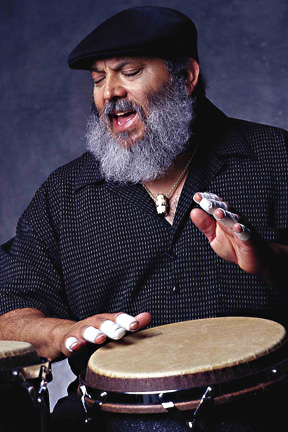 SEPT. 16/17/18 |
 COURTESY NORMAN SEEFF / CONCORD |
Keeping the beat
Poncho Sanchez is considered
a major reason for Latin jazz’s
popularity
Some 15 years ago, Latin jazz Grammy winner Poncho Sanchez and his band arrived in Little Rock, Ark. to perform in one of the state's more rural areas.
"I looked around and thought 'Man, I don't know about this?' " Sanchez says from his Southern California home.
Poncho SanchezWhen: 7 p.m. SaturdayWhere: Andrews Amphitheatre, University of Hawaii-Manoa Tickets: $25 general; $20 military, seniors, students with valid ID, and UH staff; $15 UHM students with valid ID Call: 956-2036 Also: 8 p.m. Friday at the University of Hawaii-Hilo, (808) 947-0881, 7:30 p.m. Sept. 24 at the Maui Arts & Cultural Center, (808) 242-2787), and 7 p.m. Sept. 25 at the Kauai War Memorial Convention Hall, (808) 245-8352
|
"We drove through this beautiful country when one of the guys said 'Did you know this is where they made the movie 'Deliverance'?" he said. "We saw all these guys going by with rifle racks in their trucks. You see that all the time in Los Angeles, but there aren't any rifles in them.
"Here, all the racks had rifles hanging there. I'm thinking where the heck are we going to play -- in someone's backyard with guns facing at us?"
But when the van emerged from the woods, they were in a pristine university town with a multi-story Hilton hotel and a performing arts center that made Poncho and the guys believe they could've been in L.A. or San Francisco.
"I started laughing and said 'Guys, I think (Latin jazz) is over the hump,' " Sanchez said.
But the storied journey for the music officially began in the late 1930s, with little known Latin jazz musicians and the legendary trumpeter Dizzy Gillespie.
"I've been doing this since way before the music became popular," said Sanchez, who played more than seven years with Cal Tjader, beginning in 1975.
Latin jazz is characterized by Latin dance rhythms combined with jazz melodies and chord progressions.
"It really started getting played in the U.S. during the 1950s and 1960s with Latin dances like the mambo, cha-cha-cha, samba, and bossa nova," Sanchez said. "Today, we have the salsa and meringue."
If enthusiasm were a criteria for the music, Sanchez would be the standard bearer.
"If you analyze it, it takes the joy out of it, I think," he says. "But Latin music has its own unique sound. Eight notes are played straight, not swung as in other styles of jazz, and syncopation is still common."
A wide variety of Latin percussion instruments also flavor the music. Congas are Afro-Cuban in origin, played with the palms of the hands and with the fingers. Bongos are also Afro-Cuban, but are higher-pitched and thinner in tone quality than congas. Other common instruments include timbales, claves and cowbells.
"I started on timbales," Sanchez says. "I had a friend who had a little Latin jazz band. His father made the timbales for us, so I learned to play on them."
Then he moved up to congas.
"My father bought two used congas from a pawn shop," he said. "I paid for one and he paid for one.
"Then I went into the garage and put on a Cal Tjader album and made one conga up high and the other down low, then taught myself how to play by ear."

"I had great parents and there was music in our house every day and my parents danced," Poncho Sanchez says of his family's musical influence.
"My brothers and sisters got into mambo and cha-cha-cha music that they played on the radio," Sanchez said. "Back then there was only one station in L.A. that would play it. The disc jockey was Chico Cesno who would play what he called 'musica Cubana' or 'musica Latina.' "
Sanchez would listen for hours to the conga work of Tito Puente, Machito, Tito Rodriguez, and Orchesta Aragon.
But his mother was from Vallecillo, Nuevo Leon in northern Mexico and she preferred "musica Nortena." Dad was from Matalsas, Jalisco, so he liked Mariachi. Sanchez preferred the music his sisters would play, like the Machito tunes.
"It was the first time I heard the sounds of the congas, the maracas and los bongos," he said. "I was hooked."
Sanchez doesn't mention it, but his music is considered a major influence in Latin jazz's popularity.
"We probably have been an important part in the growth because I take this music all over the world," said Sanchez, who has done 24 albums. "It was hard for me because I wanted to play a conga that comes from Africa by way of Cuba and Puerto Rico, and my ancestors are from Mexico.
"I was raised as a Chicano or Tejano. When I finally started playing a little better, I would go to Griffith Park in Los Angeles where each Sunday there were drummers playing out under a big tree.
"They were awful and some would even play on trash cans," he said. "But there was another circle that played pretty good. And then there was the best circle of them all, where the guys played really good, and they were all Cubans and Puerto Ricans."
One day when Sanchez asked if he could play with them, they asked "Are you Cuban or Puerto Rican?"
"They said I can't play because Chicanos can't play congas," Sanchez remembers.
They finally gave in when they heard him play with one of the lesser groups. The same thing happened in New York City years later with his band.
"We played at the Village Gate," Sanchez said. "Every musician I could think of was there, Manny Oquendo, Tito Puente, Patato, Caco, because they were checking us out. This was serious.
"We played and, of course, we've been back to New York many, many times."
THE BAND travels about 25 weeks a year, with several overseas performances, including for the king of Thailand in his palace.
"He loves jazz and plays clarinet and trumpet," Sanchez says. "He played with us and he sits on his throne when he does it.
"His servants crawl to him on their knees to hand him his instruments and turn the music pages.
"Heck, I bowed to him, too."
Sanchez's latest album on Concord is "Do It!" and he's getting ready to record with guitarist Ry Cooder, featuring many of the legendary musicians from the Hispanic stronghold of East Los Angeles. He has also written a conga instruction book, as well as a DVD.
"I had great parents and there was music in our house every day and my parents danced," he says.
Love and respect for the music continues to fuel Sanchez.
"I have people close to me who come up with ideas for new tunes and I'll get excited all over again," he says. "When the band plays, we feed off each other. We're a unit.
"The bottom line is I'm a conga drummer -- know what I mean?"
E-mail to Features Desk
[News] [Business] [Features] [Sports] [Editorial] [Do It Electric!]
[Classified Ads] [Search] [Subscribe] [Info] [Letter to Editor]
[Feedback]
